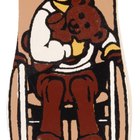
Care management is a service provided to older adults and their families. The purpose of a formal care management plan is to assess older adults' needs, and match them with needed services that will help them live independently or receive quality care if they're in a long-term care facility. Older adults who live long distances away from their children are some of the individuals who benefit from the services of a care manager.
Developing a Care Management Plan
A care management plan assures that an older adult is receiving appropriate services or treatment. Specifically, the goals and objectives of a care management plan will help assure that a senior's needs are being met. A good care management plan includes goals, objectives and strategies to help meet the objectives. However, the first step in setting up a care management plan is to conduct an assessment to determine a senior's specific needs. Once the assessment is accomplished, goals and objectives can be developed to address issues identified in the assessment.
Conducting the Needs Assessment
When a care manager conducts a needs assessment with the senior, he or she should ask questions about the individual's ability to perform activities of daily living, such as bathing, dressing and eating. The individual's mental status should be assessed to determine if their are issues such as dementia. Other information needed includes support systems that may already be in place and whether the individual is able to live independently, with minimal support, or needs 24-hour supervision. Conducting a thorough assessment will require that the care manager speak with or observe the client, talk with the family, health care professionals or others who can provide relevant information that might impact the senior care management plan.
Writing Goals and Objectives
Senior care plan goals describe the preferred situation that the care manager, family and the older adult hope to achieve.
- A goal is a broad statement that describes the desired outcome, such as "improved health."
- Objectives are measurable statements that describe what needs to happen to meet a goal.
- Strategies are the methods that will be employed to help reach goals and objectives.
For example, a goal might be to help an older client manage his diabetes successfully. The Hemoglobin A1c test is a blood test that measures the level of sugar in the blood over a three-month period. Ideally A1c should be under seven. An objective to reach this goal might be stated as follows: "The client's A1c test result will be seven or less at each doctor's visit." This is a measurable objective, because the physician orders the blood test that will return with a specific A1c number. That number will indicate whether the objective is met. If the objective is met, the goal will be achieved. One strategy to reach this objective would be to make sure the client takes his medication as prescribed. Another strategy to reach the objective would be to limit the client to 45 grams of carbohydrate at each meal.
Goals and Objectives Should be SMART
The purpose of the plan is to help the older person have the best quality of life possible. Goals and objectives should be SMART which means specific, measurable, attainable, realistic and timely. If you're encouraging the older adult to spend more time out of bed, for example, the objective is specific -- the adult will sit up -- and measurable -- for two hours -- and unless the adult has some physical difficulty the objective is attainable. The individual will sit up for brief periods until the objective is reached. It is realistic, since the adult is not required to sit up all day, but will gradually reach two hours, and it is timely -- within three months.
The Plan Should be Evaluated Periodically
When writing senior care management goals and objectives, the care manager, client and others involved should meet periodically to evaluate the plan to determine if the goals and objectives are being achieved. Goals and objectives can be revised or deleted as needed.
Related Articles

How to Set Up a Church Visitation ...

Programs to Take Care of a Disabled ...

Difference Between Assisted Living and ...

How to Get Paid for Caring for Your ...

How to Discuss Crisis Intervention ...

Preschool Teacher Requirements in ...

How to Get Paid to Care for a Relative

Old Age Home Requirements

Qualifications to Enter a State-Run ...

Aesthetic Laser Requirements in Ohio

How to Admit Someone to a Nursing Home

Ontario Grants for Family to Care for ...

How to Write a Letter of Intent to ...

How Much Money Does a Refugee Get from ...

How to Get Emergency Cash Assistance

How to Get Paid for Taking Care of ...

How to Start an After School Program in ...

California CPS Laws

How to Start an Adult Day Care Center ...

How Much Are Monthly Disability ...
References
Writer Bio
Angie Sims is a health and family writer specializing in healthy eating and parenting. She is a graduate of the University of North Carolina at Greensboro, earning a bachelor's degree in health education.
Photo Credits
Jupiterimages/BananaStock/Getty Images